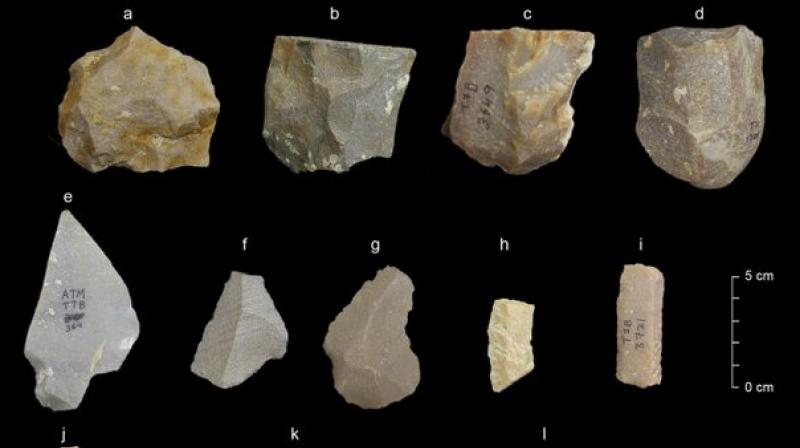Stone tools in India suggest earlier human exit from Africa

Just a week after scientists reported evidence that our species left Africa earlier than we thought, another discovery is suggesting the date might be pushed back further. Homo sapiens arose in Africa at least 3,00,000 years ago and left to colonise the globe. Scientists think there were several dispersals from Africa, not all equally successful. Last week’s report of a human jaw showed some members of our species had reached Israel by 177,000 to 194,000 years ago.
Now comes a discovery in India of stone tools, showing a style that has been associated elsewhere with our species. They were fashioned from 385,000 years ago to 172,000 years ago, showing evidence of continuity and development over that time. That starting point is a lot earlier than scientists generally think Homo sapiens left Africa.
This tool style has also been attributed to Neanderthals and possibly other species. So it’s impossible to say whether the tools were made by Homo sapiens or some evolutionary cousin, say researchers who reported the finding Wednesday in the journal Nature. “We are very cautious on this point” because no human fossils were found with the tools, several authors added in a statement.
It’s not clear how much the tool development reflects the arrival of populations or ideas from outside India, versus being more of a local development, said one author, Shanti Pappu of the Sharma Centre for Heritage Education in Chennai, India.
The tool-making style was a change from older stone tools found at the site, featuring a shift to smaller flakes, for example. Michael Petraglia, an archaeologist who specializes in human evolution in Asia but didn’t participate in the work, said he did not think the tools show that our species had left Africa so long ago.
“I simply don’t buy it,” said Petraglia of the Max Planck Institute for the Science of Human History in Jena, Germany. Instead, he said, he believes one of our evolutionary cousins in India developed the tool style independently of outside influence. The tools at the site northwest of Chennai in southeastern India are closely related to the older tool-making style there and seem to represent a transition, he said.
The idea that they reflect knowledge brought in from elsewhere would be tough to prove in India, he said. The country has few well-studied archaeological sites and only one fossil finding from this period, from a forerunner of Homo sapiens that was associated with the earlier style of tool-making, Petraglia said.

